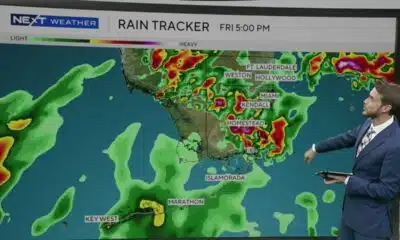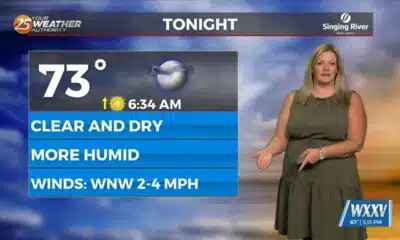News from the South - Virginia News Feed
Tropics Update: Area of interest in the Atlantic: 94-L
SUMMARY: As of July 21, the 2025 Atlantic hurricane season is about one-third complete, with only three named storms so far and overall quiet conditions in both the Atlantic and eastern Pacific basins. A new area of interest, Invest 94L, is located far east in the Atlantic but faces hostile conditions including dry Saharan dust and fast westward movement, limiting its development chances to about 10%. Historically, long gaps without named storms occur, with a notable 61-day lull in 1999. Tropical activity typically increases in August as conditions become more favorable. Tonight’s Hurricane Hub Live highlights ongoing monitoring and preparedness guidance.
13News Now chief meteorologist Tim Pandajis has the latest on the tropics. The National Hurricane Center is tracking an area of low pressure, known as Invest 94L, in the central Atlantic. Showers and thunderstorms have become less organized, and conditions are expected to become less favorable over the next day or so as the system moves west-northwest at 10–15 mph, according to hurricane forecasters.
Overall, things are quiet in the tropics, but we’re approaching a time when storm activity typically ramps up significantly.
13News Now Hurricane Center: https://www.13newsnow.com/hurricane-center
Subscribe: https://www.youtube.com/user/wvectv/?sub_confirmation=1
Download the 13News Now app: https://bit.ly/13NewsNowApp
Watch 13News Now+ for free on streaming: https://www.13newsnow.com/13NewsNowPlus
Check out our website: https://www.13newsnow.com/
Like us on Facebook: https://www.facebook.com/13newsnow/
Follow us on X/Twitter: https://x.com/13newsnow
Follow us on Instagram: https://www.instagram.com/13newsnow/
News from the South - Virginia News Feed
Congressional measure honors Angelina Resendiz, aims to help future servicemembers
SUMMARY: Texas Congressman Vicente Gonzalez has proposed legislation honoring seaman Angelina Resendiz, aiming to improve military accountability for missing servicemembers. Resendiz was reported as absent without leave (AWOL) more than a week before her death, prompting calls for clearer reporting on armed forces members found deceased under similar circumstances in the past decade. The amendment requires the Secretary of Defense to provide Congress with comprehensive reports on such cases, ensuring the military properly distinguishes between AWOL and duty status whereabouts unknown. Advocates argue this will enhance safety and accountability in the armed forces. A sailor is currently in pretrial confinement linked to Resendiz’s death, with a hearing scheduled for September 18 in Norfolk.
The lawyer for Seaman Angelina Resendiz’s family is speaking out after one Texas congressman introduced an amendment in honor of the sailor.
Subscribe: https://www.youtube.com/user/wvectv/?sub_confirmation=1
Download the 13News Now app: https://bit.ly/13NewsNowApp
Watch 13News Now+ for free on streaming: https://www.13newsnow.com/13NewsNowPlus
Check out our website: https://www.13newsnow.com/
Like us on Facebook: https://www.facebook.com/13newsnow/
Follow us on X/Twitter: https://x.com/13newsnow
Follow us on Instagram: https://www.instagram.com/13newsnow/
News from the South - Virginia News Feed
Mother says she forgives sailor who pled guilty in connection to her son's death
SUMMARY: Yorktown sailor Jackson Bower pleaded guilty to dereliction of duty in the death of master-at-arms third class Lyndon Joel Cosgriff Flax, who died in a training boating accident last April. Flax’s mother, Stephanie, who attended the court hearing, has chosen forgiveness, expressing relief that Bower accepted responsibility. Originally facing more serious charges, Bower was sentenced to 70 days in the Navy’s Chesapeake brig. Both families called on Navy leadership to accept responsibility for failures that led to the tragedy. Stephanie Flax hopes Bower honors her son’s memory and builds a positive future after serving his sentence.
Both Cosgriff-Flax’s family and Bower’s lawyer said they are asking for Navy Command to accept responsibility in the incident that caused Cosgriff-Flax’s death.
Subscribe: https://www.youtube.com/user/wvectv/?sub_confirmation=1
Download the 13News Now app: https://bit.ly/13NewsNowApp
Watch 13News Now+ for free on streaming: https://www.13newsnow.com/13NewsNowPlus
Check out our website: https://www.13newsnow.com/
Like us on Facebook: https://www.facebook.com/13newsnow/
Follow us on X/Twitter: https://x.com/13newsnow
Follow us on Instagram: https://www.instagram.com/13newsnow/
News from the South - Virginia News Feed
On the record: Winsome Earle-Sears
by Nathaniel Cline, Shannon Heckt, Markus Schmidt and Charlotte Rene Woods, Virginia Mercury
September 8, 2025
After four years presiding over the state Senate, Lt. Gov. Winsome Earle-Sears is attempting to make the leap to the governor’s mansion this fall. She is running on a platform of conservative values and her campaign largely mirrors the themes that brought Gov. Glenn Youngkin victory in 2021 — parents’ rights, fiscal responsibility and defending personal freedoms.
For most of the year she has trailed Democratic opponent Abigail Spanberger in fundraising and popularity, though the race appears to be tightening. According to an August Roanoke College poll, 39% of likely Virginia voters said they would choose Earle-Sears and 46% would pick Spanberger. In the spring, just 26% percent said they’d select Earle-Sears compared to Spanberger’s 43% of the vote. Earle-Sears’ campaign has raised over $11.5 million, according to her latest campaign finance filings, with $4.5 million in cash on hand. Spanberger has raised over $27 million and has more than $15 million in the pot.
An immigrant from Jamaica whose background and policy positions are rooted in a firm Christian faith, Earle-Sears is a married mother of three (one of her daughters is deceased). She served in Virginia’s House of Delegates from 2002 to 2003.
Earle-Sears became the first Black woman to hold statewide office in Virginia when she was elected lieutenant governor in 2021. If she ascends to the governorship, she will be the first Black woman in America to hold such a title.
The Virginia Mercury reached out to both campaigns to learn more about their priorities and how they match up with Virginians’, and to find out how they plan to accomplish their legislative goals. Spanberger sat down with the Mercury’s team for an in-depth interview at her campaign office in Central Virginia. Earle-Sears agreed to an interview but canceled on the day of and has not responded to reschedule requests and other questions. Here’s a close look at her positions and promises, based on the Mercury’s previous reporting and that of other media outlets, as well as Earle-Sears’ public statements and actions in the Virginia General Assembly.
Energy and environment
Earle-Sears has stated in previous interviews that she supports an “all of the above” energy profile for the state including nonrenewables like coal and gas.
To combat the growing demand for more energy production in the state, Earle-Sears has publicly stated her support for “all of the above” energy profile for the state. That includes coal, gas, and nuclear energy, as well as renewable sources. She has not explicitly said whether she would repeal the Virginia Clean Economy Act, which mandates the transition to renewable energy production completely for utilities by 2050, but she has disparaged it and her approach to energy needs would be in conflict with the law.
“We will use clean coal, oil, renewables, nuclear, natural gas,” Earle-Sears said in an interview with Newsmax. “That’s a national security issue. The rogue nations of this world are not just going to do solar, and they’re not just going to do wind.”
In an op-ed she wrote in the Washington Examiner, Sears called the VCEA a “disastrous law”.
Earle-Sears has also been supportive of the state’s removal from the Regional Greenhouse Gas Initiative. Sears stated on social media last year that she supported Youngkin’s executive order to remove Virginia from the agreement, calling it an unnecessary tax on residents.
“The RGGI’s energy tax also made it impossible for Virginia’s natural gas plants to compete with producers in states without an energy tax,” Sears said in her op-ed. “As a result, electric generation in the Commonwealth decreased by 9% in 2021. If Spanberger brings back the energy tax, Virginia could face billions of dollars in economic costs.”
Health care
Congress passed the One Big Beautiful Bill Act this summer, setting the stage for major changes to Medicaid and hospital funding mechanisms. As governor, Spanberger or Earle-Sears could sign off on future state budgets and legislation to address the impact to Virginia residents’ health care.
As thousands of Virginians could lose their Medicaid coverage, hospitals are also bracing for absorbing higher costs before being faced with cutting services, closing, or negotiating higher rates with private insurers.
Earle-Sears previously told Newsmax that the reconciliation “bill does so many great things.”
Meanwhile, Congress has until the end of the year to decide whether to renew expiring tax credits that help people without employer-provided health insurance purchase plans. Aetna has already announced it is leaving the Affordable Care Act marketplace by the end of the year. The reduction of credits could further increase the number of uninsured people and their potential for reliance on free clinics, federally-qualified health centers and hospitals.
In audio obtained by Cardinal News, Earle-Sears signaled interest in tapping into Virginia’s “rainy day fund,” a reserve meant for short term use, to shore up dwindling Medicaid funding. She would have to work with state lawmakers to do so; several of them who sit on financial committees told Cardinal they would support Earle-Sears’ idea but cautioned against over-utilizing in the long-term.
Immigration
Earle-Sears has spoken sparingly about immigration during her time in office, but when she does, her message has been clear: Virginia must strictly enforce immigration laws and partner closely with federal authorities.
When Youngkin announced Executive Order 47 in February — directing state police and local law enforcement to assist federal Immigration and Customs Enforcement (ICE) officers in removing undocumented immigrants accused of violent crimes — Earle-Sears linked the policy to her own journey as a legal immigrant.
“I am a legal immigrant and now a naturalized citizen. Working together, the Governor, Attorney General, and I have made Virginia safer,” she said at the time. “We’ve seen too many tragic stories after dangerous criminals in this country illegally were put back on the streets, and this Executive Order will make sure we send them back to where they came from.”
The order also coincided with Youngkin’s creation of a Virginia Homeland Security Task Force, designed to boost cooperation between state agencies, local police and federal partners, including ICE. It has drawn strong criticism from Democrats — including Earle-Sears’ opponent, Democratic gubernatorial nominee Abigail Spanberger — who argue the directive undermines community trust in law enforcement and inflates claims of criminal activity tied to immigration.
Youngkin has defended the measure, pointing to high-profile ICE courthouse raids and a “gang and immigration sweep” that his administration said led to more than 2,500 arrests of “violent criminals” who were in the country illegally.
Earle-Sears has framed the debate through a personal lens.
In unveiling a “No Sanctuary Cities” budget proposal late last year, she recalled the paperwork her family filed to immigrate legally.
“My father and I had to file documents and wait to be granted permission to enter the United States,” she said. “Under Governor Youngkin’s leadership, Virginia stands firm: we are not a sanctuary state. … The rule of law is not negotiable — it is the foundation of our safety, our freedom, and the promise of opportunity that defines America.”
While Youngkin and Attorney General Jason Miyares have been more vocal in defending the state’s immigration crackdown, Earle-Sears’ remarks underscore her alignment with the administration’s hard-line approach and her willingness to root that position in her own experience.
Public education
Recently, Earle-Sears shared her views on gender policies in Virginia schools when, at an August 21 school board meeting, she spoke against Arlington Public Schools’ transgender bathroom policy that allows students to use bathrooms and locker rooms that align with their gender identity.
“What is happening in our schools right now is just, it’s dangerous, it’s insane and it has to stop,” Sears said. “Here’s the truth. There are two sexes, boys and girls, and for generations, we’ve understood this — that they deserve their own sports teams, their own locker rooms, their own bathrooms.”
During her tenure as lieutenant governor, Sears has been vocal about her support of enforcing gender-segregated policies much like the Youngkin administration, which overhauled policies to require students to use bathrooms and locker rooms based on their sex assigned at birth.
Conservatives argue that having students use bathrooms and locker rooms based on their sex at birth protects other students and preserves moral and religious foundations.
The Mercury contacted Earle-Sears’ campaign to learn more about her history on gender policies, considering she has served on the state’s Board of Education, even as vice president, and did not raise these concerns about gender issues in public education during her tenure. She did not respond.
Earle-Sears has taken stands to overturn Virginia’s ban on conversion therapy, which is a practice that attempts to change someone’s sexual orientation or gender identity that the American Psychological Association said is not rooted in science and can be harmful.
She also supported other schooling options including proposals that would allow low-income parents to use the state portion of per-pupil funding for tuition at private schools or for other education expenses.
Reproductive rights
Earle-Sears has made her stance against abortion clear during and before her gubernatorial campaign’s launch.
She served as a keynote speaker at this year’s March for Life anti-abortion rally in Richmond, asking the crowd of about 2,000 attendees, “We stand for life and how can it ever be wrong to stand for life?”
During Virginia’s General Assembly session this year, Earle-Sears expressed opposition to Virginia’s in-progress effort to enshrine reproductive rights including abortion into the constitution, but has not answered follow-up questions on whether she would support the measure if its language were adjusted.
When signing the advanced legislation earlier this year, her duty as lieutenant governor, Earle-Sears wrote that she was “morally opposed to this bill; no protections for the child.”
During her 2021 lieutenant governor campaignshe described abortions at “genocide” and noted threat to the life of the parent-to-be as the only exception she believed the procedure should have. But closer to Election Day that year, she scrubbed anti-abortion language from her campaign website.
Republican-led abortion restrictions or near-total bans that have been proposed in the legislature did not advance far enough for her to weigh in with a tie-breaking vote. She did cast such a vote on a right-to-contraception bill, voting against it.
Elections and voting
Earle-Sears has consistently framed election integrity as central to her public message, emphasizing that only U.S. citizens should have access to the ballot while largely avoiding debate on restoring voting rights for felons who have completed their sentences.
After the U.S. Supreme Court issued an emergency stay last October allowing Virginia to continue removing thousands of people from its voter rolls under Youngkin’s order, Earle-Sears praised the decision as a victory for fairness.
“As an immigrant and a naturalized citizen of our great country, I am personally grateful for this decision that upholds the rule of law,” she said in a statement. “Voting is one of the most fundamental rights we have as Americans and this decision is essential in protecting the rights of naturalized citizens and all Americans.”
She also thanked Attorney General Jason Miyares for defending the policy in court, saying Virginians could cast ballots “with ease” and have “complete confidence our elections are free from politically-motivated interference.”
Democrats criticized the order as a voter purge, while Republicans cast it as enforcing laws already on the books.
Earle-Sears has used her platform to remind Virginians that state law has long required removal of non-citizens from voter rolls. In a Facebook post in October, she highlighted that in 2006 then-Gov. Tim Kaine, a Democrat, signed legislation to that effect.
“It was the law then and it REMAINS the law now,” she wrote, presenting the statute as a guardrail against fraud.
Her rhetoric on elections has also touched on the political fallout from President Donald Trump’s efforts to challenge the 2020 results.
Following the 2022 midterms, she told the Associated Press that Republicans received “a very clear message” from voters and that “it is time to move on” from Trump. While not outlining specific reforms, the remarks placed her among GOP officials urging the party to look ahead rather than dwell on Trump’s grievance.
On one of the most contentious state debates — whether to automatically restore voting rights for felons who have served their time — Earle-Sears has remained mostly silent.
Youngkin ended his predecessors’ automatic restoration policy in favor of case-by-case review, leaving thousands uncertain about their eligibility. Earle-Sears has not publicly commented on the shift, even as civil rights advocates and Democrats push a constitutional amendment to guarantee automatic restoration.
Housing policy
The U.S. Chamber of Commerce estimates there’s a shortage of about 4.5 million homes in America, nearly a third of Virginia households spend over 30% of their income on housing costs, and there’s a severe lack of affordable housing options statewide, state studies found. Housing policies would have been a focal point of The Mercury’s planned August interview with Earle-Sears because it’s not a subject she has addressed specifically on the campaign trail.
She has, however, spoken broadly about goals to address the cost of living. To help with this, Earle-Sears plans to push to eliminate the state’s car tax — a long-simmering proposal politicians in both parties have explored but have yet to fully achieve.
Earle-Sears’ campaign website also states that she “will scour the government books to cut wasteful government spending and job-killing regulations because taxpayers know how to spend their money and run their businesses better than (the) government.”
While none of these policies tie directly to housing, in theory money constituents save elsewhere could decrease housing affordability burdens.
Criminal justice and policing
At an August campaign event in Chesterfield County, Earle-Sears reiterated her commitment to supporting law enforcement officials.
“I believe in ‘backing the blue,’ I believe in honoring our law enforcement,” she said.
Earle-Sears added that she planned to support legislation that would prevent the first $20,000 of law enforcement officers’ salaries from being taxed by the state.
“We need them and we don’t have enough of them,” she said.
She also supports Trump’s ramp up of deportations for undocumented immigrants. Her campaign website mentions opposing “radical policies like catch and release.”
On the flip side, she signaled a warm response to a bipartisan probation reform bill that passed this year, designed to help former prisoners shorten their probation times by achieving different rehabilitative milestones.
Though she declined to comment further on the measure when asked by The Mercury at the time, during a Feb. 12 segment of conservative radio program The John Fredericks Show, Earle-Sears said that the state should “do as much as possible to ensure we don’t spend money twice” — a reference to housing people in prisons and jails or processing them through the court systems when they reoffend.
She discussed broader access to educational and vocational opportunities for incarcerated individuals, aiming to help with employment and housing once their sentences are completed.
“If we can give them incentives then we can get them engaged, get them an education. … Then if you have a job, of course there’s something about work that dignifies the soul,” Earle-Sears said. “I’m all for lifting up that soul.”
Her background providing Christian ministry in prisons likely informs her views on second chances.
The second part of the Mercury’s On the Record series, featuring Democratic governor nominee Abigail Spanberger, will be published Tuesday, September 9. Read more of our Election 2025 coverage here.
YOU MAKE OUR WORK POSSIBLE.
Virginia Mercury is part of States Newsroom, a nonprofit news network supported by grants and a coalition of donors as a 501c(3) public charity. Virginia Mercury maintains editorial independence. Contact Editor Samantha Willis for questions: info@virginiamercury.com.
The post On the record: Winsome Earle-Sears appeared first on virginiamercury.com
Note: The following A.I. based commentary is not part of the original article, reproduced above, but is offered in the hopes that it will promote greater media literacy and critical thinking, by making any potential bias more visible to the reader –Staff Editor.
Political Bias Rating: Center-Right
This content provides a detailed profile of Republican gubernatorial nominee Winsome Earle-Sears, outlining her conservative policy positions and actions in office. The coverage highlights her alignment with typical conservative priorities such as parents’ rights, fiscal responsibility, support for law enforcement, strict immigration enforcement, opposition to abortion rights expansion, and an “all of the above” energy approach including fossil fuels. Although the tone is generally factual and informative, the emphasis on her conservative stances and campaign platform positions the content on the center-right of the political spectrum. It refrains from overt editorializing or partisan criticism, maintaining a primarily descriptive and balanced style within a right-leaning context.
-
News from the South - Louisiana News Feed7 days ago
Portion of Gentilly Ridge Apartments residents return home, others remain displaced
-
News from the South - North Carolina News Feed7 days ago
Hanig will vie for 1st Congressional District seat of Davis | North Carolina
-
News from the South - West Virginia News Feed7 days ago
WV Supreme Court will hear BOE’s appeal in vaccine lawsuit — but not right away
-
Local News Video7 days ago
9/4 – Sam Lucey's “A Little More Humid” Thursday Night Forecast
-
News from the South - Missouri News Feed7 days ago
ICE arrests fell in August despite show of force in DC, Los Angeles
-
Our Mississippi Home7 days ago
Cruisin’ the Coast: Where Memory Meets the Open Road
-
Mississippi Today7 days ago
PSC moves toward placing Holly Springs utility into receivership
-
News from the South - North Carolina News Feed5 days ago
Reagan era credit pumps billions into North Carolina housing | North Carolina












































